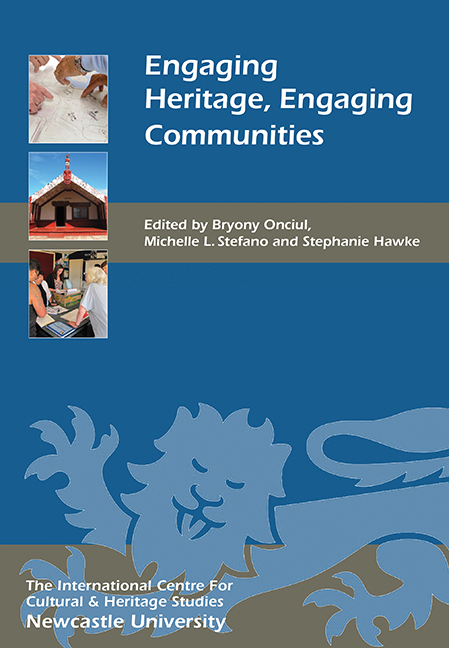Book contents
- Frontmatter
- Contents
- List of Illustrations
- Acknowledgments
- Introduction
- Engaging Concepts
- 1 The Gate in the Wall: Beyond Happiness-making in Museums
- 2 Assembling Communities: Curatorial Practices, Material Cultures and Meanings
- 3 Interview – John Tunbridge
- 4 Interview – Gregory Ashworth
- 5 Engaging with Māori and Archaeologists: Heritage Theory and Practice in Āotearoa New Zealand
- 6 Horizontality: Tactical Politics for Participation and Museums
- Engaging Creatively
- Engaging Challenges
- List of Contributors
- Index
- Miscellaneous Endmatter
4 - Interview – Gregory Ashworth
from Engaging Concepts
Published online by Cambridge University Press: 13 April 2017
- Frontmatter
- Contents
- List of Illustrations
- Acknowledgments
- Introduction
- Engaging Concepts
- 1 The Gate in the Wall: Beyond Happiness-making in Museums
- 2 Assembling Communities: Curatorial Practices, Material Cultures and Meanings
- 3 Interview – John Tunbridge
- 4 Interview – Gregory Ashworth
- 5 Engaging with Māori and Archaeologists: Heritage Theory and Practice in Āotearoa New Zealand
- 6 Horizontality: Tactical Politics for Participation and Museums
- Engaging Creatively
- Engaging Challenges
- List of Contributors
- Index
- Miscellaneous Endmatter
Summary
Please could you reflect on your career so far, focusing on your work in relation to how communities engage with heritage?
I have a disciplinary background in Geography and a PhD in the geography of tourism from as early as 1974. From 1979 I taught urban geography at Groningen, where geography is closely linked to planning. While writing a book on the West European city (1980), I became aware of the extent of the preservation of monuments and the conservation of historic areas in cities, which at a simple level were disturbing the urban geography models and complicating utopian urban planning. I developed this interest in the course of the 1980s, building up an expertise on how, and to an extent why, different countries and cities used the past in the present. This culminated in the ‘tourist-historic city’ (1990) beginning a writing partnership with John Tunbridge on these themes that is still continuing 25 years, and five major books on heritage, later.
How would you define heritage?
I first used the word ‘heritage’ in a publication in 1992. Before that I would have used the term ‘conservation’, which was popular in town planning from the 1960s. I wrote a book in 1992 with the provisional title of ‘urban conservation planning’ but at the last minute changed the title to ‘heritage planning’ with a hurried justification of what I meant by the term ‘heritage’, which for me was ‘the contemporary uses of pasts’. This quite fundamental paradigm shift occurred in my own thinking largely uninfluenced by other academics, as none, with the possible exception of Lowenthal and some early Bourdieu, were thinking outside the fundamentalist dogmas of preservationism, which still dominate most government agencies, nationally and internationally.
What does community engagement mean to you in your work?
I tend to be suspicious of the term ‘community’, as it not only has multiple meanings but has acquired a sanctity, especially in the US, which renders it indisputable and unchallengeable. I belong to and engage with many communities, some of which have a spatial dimension but most of which do not. Having expressed my caution with the term, there is, however, one type of ‘community’ that has had a persistent presence not only in my work but in my life: that is, the reactions of localities to the actions of governments that they perceive to be threatening.
- Type
- Chapter
- Information
- Engaging Heritage, Engaging Communities , pp. 51 - 54Publisher: Boydell & BrewerPrint publication year: 2017



